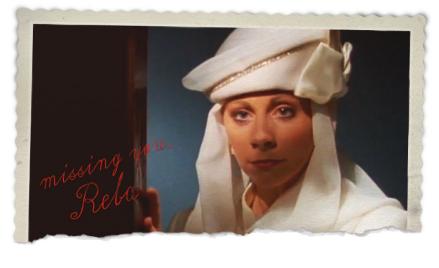Postcards From Camp
Does camp have to be accidental?

The Marquise Isabelle de Merteuil enters her customary box at the opera. The bustling throng of aristocrats notices her presence, falls silent. A sudden, thickly annunciated “boo” breaks the pall and spreads around the auditorium; the marquise’s countenance hardens. Resolute, she turns to exit, but as she takes her first step away from the crowd-turned-jury, she falters, dips, founders ever so slightly. Because only her shoulders and head are in the frame, we do not see what caused the stumble, what fold of carpet or knot of wood caught her heel, but it doesn’t matter. The marquise, a savant of social footing, trips; and I tumble along with her, directly into the camp sublime.
The “Glenn Close shuffle” from Dangerous Liaisons raises a question that has long vexed discussions of camp: Must it be accidental, or may it be intentional? Can nuances be planted, like bulbs lying dormant until the spring? Who, in the aesthetic exchange, is ultimately responsible for camp—the “author” or the “reader?”
After all, the marquise’s stumble is no cinematic accident; it is clearly a planned maneuver, a bit of blocking designed to symbolize a more metaphysical fall from grace. But can a stage direction really count as a camp nuance? The question itself may be oversimplifying things. It matters what kind of direction—or to abstract our terms just a little, what kind of “text”—we’re talking about. Is this particular text (i.e., Glenn Close’s stumble) “generous”—that is, thick and rich with texture, open to the idiosyncratic approaches of the individual reader? Or is it “stingy”—thin and one-note, insistent on conveying a single, straightforward meaning? Does the text tell us what to think or enjoin us to think for ourselves?
Before I render a verdict on the GCS, let’s examine two texts from a very different class and aesthetic milieu that demonstrate this dichotomy: Reba McEntire’s country music catalog.* In the video for “Does He Love You,” McEntire and duet partner Linda Davis play movie stars dealing with the strife and uncertainty that comes with loving the same leading man. They travel from red carpets to empty bars to storm-soaked lakeside cottages in their quest for resolution (and move through just as many confounding outfits, including the sartorial miracle of Reba’s Lawrence of Arabia ensemble); in the end, McEntire brings closure to the torment by (spoiler alert) blowing up Davis and her lover on a speedboat.
If you still didn’t understand what campy means, now you do. And in fact, given the awkward, unnecessary coda where a cheesy director shows everyone the bomb footage, you also know what kitsch is, too. Now watch “Fancy,” McEntire’s humid ballad of a teenage girl whose mother turns her out because she could not afford to keep her in their “one room, rundown shack/ on the outskirts of New Orleans.”
“Faaanncy … Faaanncccy … ” It’s genius, right? It’s also an example of that “generous” kind of text I described earlier, which we can juxtapose with the stinginess of “Does He Love You.” The latter video traffics in an obvious, self-aware brand of campiness. Its creators clearly set out to create a campy, even kitschy production by making promiscuous use of outlandish costumes, dramatic Hollywood (or at least Lifetime movie) tropes, bizarre lighting, and (this is saying something in country music) exaggerated hairstyling. “Does He Love You” is enjoyable, of course, if you like that sort of thing; but its transparent constructedness as a text limits the way a reader can engage—as intentionally funny as it may be, that same intentionality also leaves it stifling—or, as some like to put it, dead.
Roland Barthes called this kind of text “readerly,” meaning that it presented the reader with a familiar, banal, easily digestible set of materials that renders him a passive receiver. Far more interesting in Barthes’ estimation were “writerly” texts, those that were generous and spacious enough to allow the reader some freedom to bring himself to the writing desk; these texts suggest or even demand that the audience be actively involved in the “writing” of the text itself. You may have heard that Barthes is responsible for “the death of the author,” and this is why. The way in which a reader engages with the writerly text cannot be controlled by its author—her intentions, whatever meanings she meant to convey in the text, simply have no bearing on the matter. And this is a good thing. As has been noted elsewhere, what the “death of the author” really indicates is the liberation of the reader.
“Fancy,” then, is a writerly text. Despite its clear narrative structure, it leaves enough room for you and me to find our own moments of bliss. We get to, in effect, collaborate in “writing” the music video, and the disparate versions that we produce are all equally valid, all worthy final drafts of “Fancy.” My version, for instance, focuses the sly, Vaudeville-sized smirk Fancy flashes toward the camera when she recounts gettin’ her an “elegant New York townhouse flat.” I find camp in that syllable-contingent piece of architecture. Readerly texts make nuances like this difficult to attend to (Linda Davis’ shoulder pads get in the way). Writerly texts, on the other hand, welcome nuance (or at least tolerate it), and hence, make for excellent camp playgrounds.

"Fancy" still courtesy of Vevo
So, back to our opening question: Can you plant a nuance? Can you consciously cultivate true camp? Well, no. But you can create a garden hospitable to its growth; you can fertilize the soil with “writerly” freedom so that your chances of a good harvest are increased. Ryan Murphy has done this expertly in his American Horror Story series, for example, as did David Lynch in Twin Peaks. Both shows used weird, proprietary mulch blends and offered enough heat, moisture, and air to encourage a range of campy blooms; but in the end, the actual germination is dependent on the reader. Individual results may vary.
And thank Gaga for that, because there are so few spaces in life where reception is prized over artistic intent. One of my favorites is, indeed, the Glenn Close shuffle, which, though certainly planned, serves as a kind of supporting tree for all manner of orchids. My blood-red specimen is the way her painted lips stay rock-static throughout the whole ordeal (even when she’s taking the makeup off later—they never move!). Wanna show me yours?
Correction, April 5, 2013: This post originally misspelled Reba McEntire's last name. (Return to the corrected sentence.)
